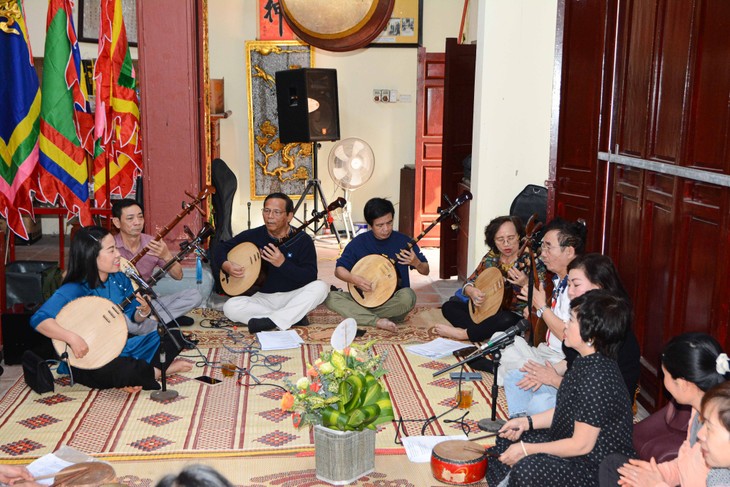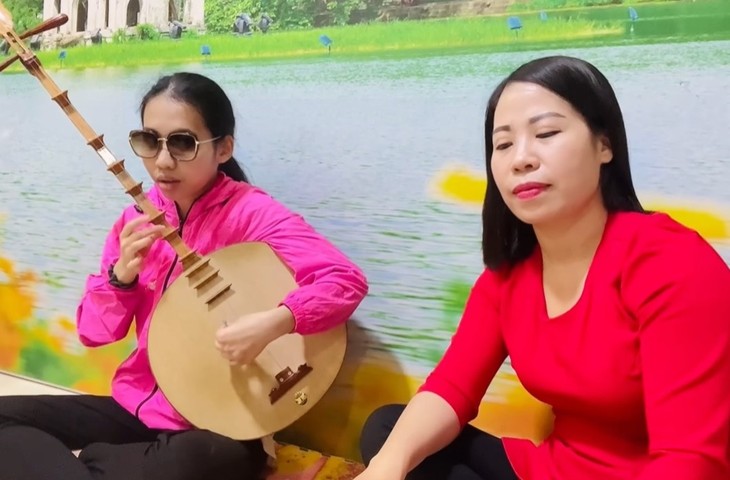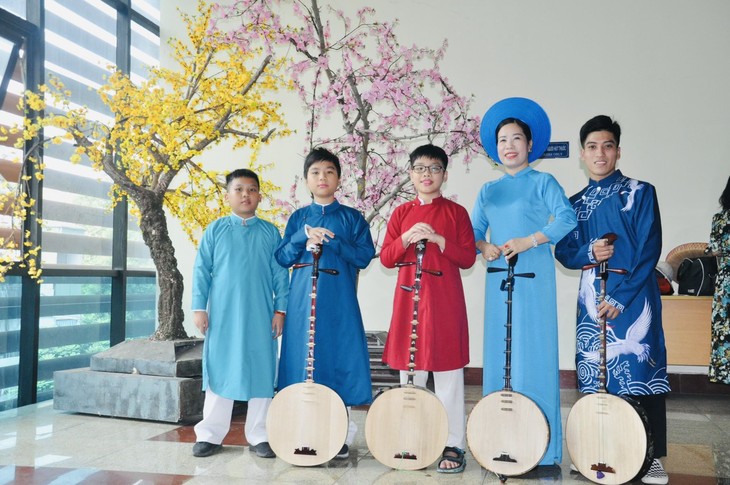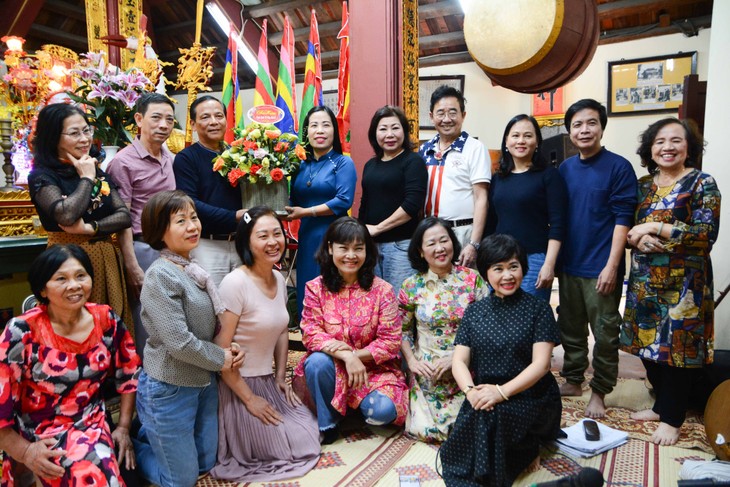Chau Van, or Vietnamese ritual singing, is a traditional art form which originated in Vietnam’s Northern Delta region. “Chau” means supplication, and “Van” means literature. This highly rhythmic style of singing, often performed during “hau dong” (mediumship) rituals, is intended to honor the Mother Goddess or connect with other gods. Chau Van serves two purposes: to help hypnotize the medium for reception of the deities, and to accompany the medium's actions with appropriate music.
Not everyone can pursue Chau Van for an extended period, adhere to it, and live with it like Tuyet Tuyet does. Becoming a "cung văn" requires of the singer more than just passion. There are additional qualities and skills that are needed.
Tuyet shared: "Singing Chau Van requires singing with wholeheartedness and passion. If sung superficially, it will not feel good. You must understand the lyrics of Chau Van, which are exceptional, advising people to live ethically and to remember the source of the water you drink. Chau Van lyrics also depict the beautiful and majestic scenery of Vietnam. Its melodies are diverse and rich. When speed is required, the tempo can be fast, but when depth and intensity are needed, it is also very profound. Some foreign audiences have told me that they feel Chau Van is like "Vietnamese rock music."
 Bich Cau Dao Quan, one of artist Tuyet Tuyet's Chau Van classes. (Photo courtesy of Tuyet) Bich Cau Dao Quan, one of artist Tuyet Tuyet's Chau Van classes. (Photo courtesy of Tuyet) |
Teaching and learning Chau Van is challenging, as learners must not only sing the melodies accurately, but also grasp the rhythm, comprehend the lyrics, and play instruments such as the moon-shaped lute and a set of phach, wooden sticks beaten against a hollow bamboo.
“Students in my class vary from 9-year-olds to retired adults. There are several groups of students attending my classes, including children, teenagers, visually impaired people, as well as blind or severely visually impaired children with mental retardation. There are also retired adults, businessmen, foreigners, and individuals aiming to pursue a professional path in Chau Van. Each group requires tailored teaching methods and approaches," says Tuyet.
Tuyet does not limit herself or others in their opportunities to engage with Chau Van. Because she welcomes students from diverse backgrounds in order to make ritual singing accessible to all, Tuyet is continually seeking new ways to deliver the teaching and introduce Chau Van to as many people as possible.
Teaching Chau Van to a blind student requires an effort from both the student and the teacher. Just raising your voice slightly can make them feel discouraged and trigger low self-esteem, Tuyet says.
“Other students I can simply provide written instructions to follow, but when teaching the blind, I have to teach them verbally, record the lesson, allow them to take the recording home to listen to, and then they may have to transcribe the material into Braille for future guidance. Learning to play the moon-shaped lute is a crucial aspect of performing Chau Van songs. Usually I can demonstrate visually, but for blind individuals that isn’t possible. Despite these difficulties, I pay close attention to them and offer them reduced tuition fees. In some cases, I teach them free of charge. My goal is to equip them with skills for the future, enabling them to find employment, be independent, and support themselves, as they may find it more difficult to engage in physically demanding work," she shared.
 Tuyet Tuyet teaches Chau Van to a blind student. (Photo courtesy of Tuyet) Tuyet Tuyet teaches Chau Van to a blind student. (Photo courtesy of Tuyet) |
Because of her enthusiasm for Chau Van and her desire to pass it on to people from all walks of life, Tuyet Tuyet's classes have gained wide attention. Her students come not just from Hanoi, where she lives, but from many provinces and cities across Vietnam, and as far away as the US, the UK, and Japan.
Tuyet said: “My students come from many provinces, including Hoa Binh, Lai Chau, and Hai Phong. They’re so passionate about Chau Van that they’ll travel a hundred kilometers every weekend to Hanoi, rent a room for one night, and then return the next day. Some students live too far away to come study in person. They message me and ask me to teach them, so I’ve recorded lessons on several Chau Van songs and how to play the moon-shaped lute and shared them on social media platforms like YouTube, TikTok, and Facebook. This enables them to learn at home."
 Tuyet Tuyet and her students. (Photo courtesy of Tuyet) Tuyet Tuyet and her students. (Photo courtesy of Tuyet) |
Tuyet Tuyet says the most meaningful encouragement and recognition comes from her audience. She is elated that her students are now spread across the country. When she goes out, people recognize her on the street and say they often watch online video clips of her singing Chau Van.
Tuyet’s greatest joy comes from seeing her students’ progress, particularly the ones who are visually impaired. Her teaching gives them greater confidence and reduces their feelings of inferiority.
Minh Chau, a visually impaired student at Tuyet’s class, said: "Teacher, my friends show me a lot of love when I come to class, especially those with bright eyes. They compliment me on my singing, invite me to join them in activities, and often request that I perform Chau Van songs for them."
 Artist Tuyet Tuyet and her students. (Photo courtesy of Tuyet) Artist Tuyet Tuyet and her students. (Photo courtesy of Tuyet) |
Despite her efforts to preserve Chau Van, Tuyet is concerned that this art form has changed. Many mediums now incorporate modern orchestral elements into ritual ceremonies, such as electronic drums, guitars, and organs. Singers are required to perform against this modern musical backdrop. As a result, the traditional rustic melodies of Chau Van are seldom heard as they once were.
"I acknowledge that society is becoming increasingly modern, and as time passes, folk music, too, needs to be refreshed to appeal to the public and avoid being seen as outdated and solely for the older generation. My advice to young people is that, while we can innovate with Chau Van, we mustn’t lose its essence. Nowadays, many view singing Chau Van as a trend, but they sing it in a style that deviates from its true essence, almost resembling bolero. Incorporating new musical instruments is not wrong, but it should be done in moderation to preserve the authentic quality of the art and prevent its misuse," Tuyet shared.
 Tuyet Tuyet and her students after a Chau Van performance. (Photo courtesy of Tuyet) Tuyet Tuyet and her students after a Chau Van performance. (Photo courtesy of Tuyet) |
After dedicating 24 years to Chau Van, Tuyet Tuyet is ready to devote the rest of her life to this passion.
She said: "I currently teach only at home, and the space is limited, so I can’t accommodate too many students. I hope that, in the future, I’ll find a place with enough room to accommodate more students and also find artists willing to join me on this journey so I can teach even more students."